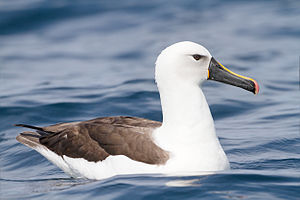

The Falaises d'Entrecasteaux (French pronunciation: [falɛz dɑ̃tʁəkasto]; in English the Cliffs of Entrecasteaux, named after 18th century French navigator Bruni d'Entrecasteaux) comprise the cliffs, which reach heights of over 700 m, along the west coast of Amsterdam Island, a small French territory in the southern Indian Ocean.
Important Bird Area
The western coastline of the island, including the cliffs, has been identified as a 360 ha Important Bird Area (IBA) by BirdLife International because it is home to one of the largest colonies of Indian yellow-nosed albatrosses in the world, with about 19,000 pairs constituting some 20% of the world population, and about 240 pairs of sooty albatrosses. There is also a large colony of northern rockhopper penguins, with 25,000 pairs. Two species, grey and soft-plumaged petrels, which have become rare on the island due to predation by rats and cats, are thought to breed in the IBA. There is a large rookery of subantarctic fur seals in the IBA. Ten endemic arthropods have been recorded.
The vegetation, which includes three endemic plant species, is dominated by tussock-grasses and rushes which are densest towards the foot of the cliffs. Because of the inaccessibility of the cliffs, the vegetation of the cliff-ledges was never grazed by the feral cattle that used to inhabit the island.
References
- ^ BirdLife International. (2012). Important Bird Areas factsheet: Falaises d'Entrecasteaux. Downloaded from "BirdLife International - conserving the world's birds". Archived from the original on 2007-07-10. Retrieved 2012-11-14. on 2012-01-08.
| Important Bird Areas of the French Southern Territories | |
|---|---|
| Amsterdam and Saint Paul Islands | |
| Crozet Islands | |
| Kerguelen Islands | |
| Scattered Islands | |
37°51′S 77°31′E / 37.850°S 77.517°E / -37.850; 77.517
This French Southern Territories location article is a stub. You can help Misplaced Pages by expanding it. |